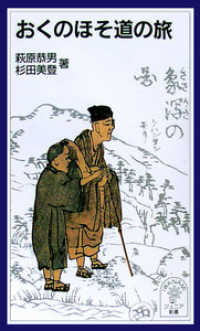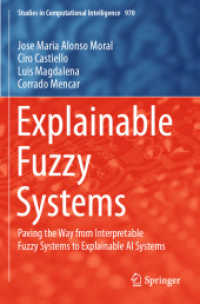Full Description
A Life Course Approach to the Epidemiology of Chronic Diseases and Ageing, Third Edition outlines how biological and social factors during gestation, childhood, adolescence and earlier adult life influence later life health and disease. It also looks at whether and how to intervene to improve health outcomes.
This revised third edition is fully updated to reflect the new data that has emerged as well as our new understanding of health and global challenges. It brings new chapters on a life course approach to the long-term health consequences of climate change and the COVID-19 pandemic. It examines the current and potential use of new technologies, methods and collaborative approaches in life course studies and provides updated reviews of the latest life course evidence for age-related chronic diseases. It discusses how life course research is being used, and could be used, to improve population health in high, middle, and low-income countries, identifying how and when interventions may be most effective. New chapters on multimorbidity, translational geroscience and exposomics have also been added.
Contents
SECTION I. Opportunities and challenges for life course epidemiology in the 2020s
1: Diana Kuh, Joanna M. Blodgett, Mark Hanson, Ezra Susser, and Yoav Ben-Shlomo: Introduction to the third edition
2: Diana Kuh, Joanna M. Blodgett, W. Ian Lipkin, and Ezra Susser: A life course approach to health in the age of pandemics
3: Elisabeth M. Simonin, Sotheany Leap, Ellie S. Klibaner-Schiff, Sarah Kirsh, Olivia Kline, Hannah Matthews, Nicholas Vogler, Claire Kepner, Vanitha Sampath, Mary M. Johnson, and Kari C. Nadeau: The value of a life course approach to the health consequences of climate change
4: Oliver Robinson, Paolo Vineis, and Giovanni Fiorito: Capturing exposures from childhood to adulthood with exposomics
5: Claudia Börnhorst, Marvin N. Wright, and Vanessa Didelez: New analytical approaches to life course analyses
6: Nicholas J. Timpson and Claire Steves: Maximizing the value of life course studies
SECTION II. Life course epidemiology for chronic diseases and ageing
7: Lauren C. Houghton, Michelle Lui, and Mary Beth Terry: A life course approach to cancer
8: Linda O'Keefe, Gita D. Mishra, and Rebecca Hardy: A life course approach to cardiovascular disease
9: Wei Perng, Izzuddin M. Aris, Jill Norris, and Dana Dabelea: A life course approach to obesity and diabetes
10: James P. Allinson and Peter Lange: A life course approach to lung function and respiratory disease
11: Sarah-Naomi James, Jonathan M. Schott, and Yoav Ben-Shlomo: A life course approach to neurodegeneration
12: Katherine M. Keyes and Gonzalo Martínez-Alés: A life course approach to mental health and well-being
13: Anne B. Newman and Rachel Cooper: A life course approach to multimorbidity and healthy ageing
14: Daniel W. Belsky, David M. Wilson III, and Luigi Ferrucci: Translational geroscience: A life course perspective
SECTION III. Implications of a life course approach for policy and interventions
15: Mark Hanson, Chandni Maria Jacob, and Keith Godfrey: Influencing policies for public health interventions using a life course perspective focusing on the developmental origins of health and disease (DOHaD)
16: K.S. Joseph and Michael S. Kramer: Expected impact of interventions to increase fetal and infant growth
17: Natalie Slopen and Jack P. Shonkoff: Employing life course epidemiology to catalyze larger impacts of early child policies on lifelong health
18: Joanna M. Blodgett, Gregore Iven Mielke, and Eleanor Winpenny: A life course approach to the development of health behaviours
19: Caroline Fall, Ryan G. Wagner, Shane Norris, and Stephen Tollman: Chronic disease and ageing: A life course approach to policy and interventions in lower income countries
20: John R. Beard, Yuan Zhang, and Allison E. Aiello: A life course approach to promoting healthy longevity
SECTION IV. Conclusions
21: Yoav Ben-Shlomo, Joanna M. Blodgett, Ezra Susser, and Diana Kuh: Challenges, priorities, and future directions for life course epidemiology








